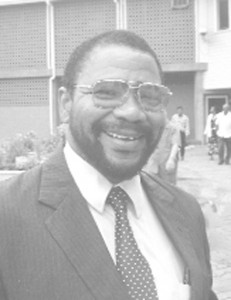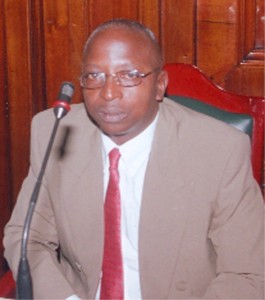– AFC, GAP-ROAR doubt climate is right
PNCR leader Robert Corbin has renewed the push for the adoption of a shared governance system, but doubts have surfaced about whether the climate is right.

In a national new year’s broadcast, Corbin said this year must mark “a decisive shift” towards genuine national unity through shared governance, calling it the start of the journey towards self-development. He added the government must strip itself of its pretence and its inward looking political posture and listen to the voices of the people. “I am once again calling for a genuine inclusiveness that embraces all stakeholders in our society in the process of building this nation,” he announced. “The prevailing exclusionary approach to governing Guyana will bring us nothing but disappointment and disaster.”
Stabroek News contacted Corbin, however, he was unable to talk owing to an injury. He promised, however, to answer questions about the party’s plans this week.

Despite President Bharrat Jagdeo’s pledge of an enhanced framework for political cooperation, there is agreement among the parliamentary opposition that the current system excludes any meaningful participation in governance. But at the same time, the AFC and GAP-ROAR are sceptical about power sharing and both say the fundamental shift has to begin to with participation at the local government level.
AFC leader Raphael Trotman says at the moment there is no platform for sustainable executive power sharing, saying there is a lack of respect and trust among the political actors. What is more, he thinks that any meaningful move in this direction needs to begin with a fundamental devolution of power, starting at the community level.

“I don’t believe the climate exists for executive power sharing, short of forcing the PPP to do it,” Trotman explains. He warns that if the PPP “is brought to the table under duress” the process would not be sustainable. The recent events in Zimbabwe illustrate the point, as a deal for a unity government signed between President Robert Mugabe’s ZANU-PF and opposition leader Morgan Tsvangirai has yet to see any progress. According to Trotman it is clear that there is a lack of respect among the two parties and although the ZANU-PF signed it has no interest in any meaningful sharing of power. “So, if the climate is not right, it is not going to happen,” he observes.
Emphasising the need for a “transformation” in the organisation of the country’s system of governance, the AFC is advocating a bottom up approach that begins with empowering people at the level of villages and communities. Trotman says Village Councils and Neighbourhood Democratic Councils need to be reconstituted and given new levels of autonomy while Regional Democratic Councils need to be allowed to function with less interference from central government, including independent executive officers. He adds that there is also need for a proper constituency system to ensure a balance of greater representation with proper accountability. In this regard, he said the AFC will be pushing for change in the current party list system, in favour of one that would allow the people to directly elect representatives to the parliament to represent their constituency.
Although he awaits a detailed definition of the shared governance concept now being plugged, GAP-ROAR MP Everall Franklin believes that the lack of trust among the parties is guaranteed to shut the door on it. “Shared governance has to be based on trust,” he stresses, while noting the need for all players to emerge from the trappings of the past. He said that there is also paranoia among government representatives about even talking to the opposition because of the predominating feeling that “if you are not with me, you are against me.” In addition to a lack of trust among the parties, he says that there is mistrust even within the ranks of the two major parties. “If even within your own party, you have questions about your motives and people are unhappy, how can you convey the confidence to those [outside] that you could work together? I don’t think the present leadership conveys the confidence that this could work.”
But Franklin admits that the current system is far from truly democratic. He is critical of the government’s current approach in the parliament, saying that it continues to push through its legislative agenda without any regard for the feelings of anybody else simply because it has the majority. He likens participating in the house to participating in a “charade” at times, adding that no one has a monopoly on intelligence. Given the crisis created by the level of flooding experienced in coastal communities he expected government to involve all the stakeholders in a nationally coordinated response to help those people who have been affected. Instead, he says there has only been propagandising while blame is assigned to ‘opposition elements.’
Building trust cannot be left to the political parties, says Franklin, who thinks it is best suited to an active civil society, though he notes that civil society groups have also been beset by distrust. He is referring to the trade unions whose leadership he notes has been compromised by their political involvement. Like Trotman, he also believes that power sharing has to start at the local government level. He says, “If on the ground level we can work together to achieve it, it lays the foundation for it to happen at the highest level.” On this point, he laments the extended absence of local government elections, saying it has denied the people the opportunity of solving their own problems. “That is how true democracy is built.”
In 2002, the PNCR presented its original blueprint for shared governance at the invitation of the Social Partners civil society grouping. The proposal, developed by a committee headed by now ousted executive James McAllister, conceptualised a cabinet comprising all the major parties and the re-introduction of a non-executive head of state appointed from the party with the largest popular vote. The arrangement would have been placed under the supervision of the parliamentary committee on constitutional reform for constant review through its own research and analysis, and by encouraging and examining submissions from the public.
The major proposals were consistent with the PNC’s submission to the Constitution Reform Commission in which it advocated “inclusivity” as a form of government that would be relevant to the problems facing the nation. “Inclusivity” was defined as a system of governance that would involve all interests, including the majority party and the opposition.
The proposals called for proportional representation, as determined by periodic national elections, to be used to fix each party’s level of involvement in the national government. They also recognised the need for predetermined structures and procedures to be enshrined in the constitution or in any multiparty agreement to facilitate decision-making by consensus and to resolve disputes in the national executive. It was envisaged that the larger the margin of victory of the winning party, the fewer would be the inhibitions to the exercise of its powers in the multiparty executive. And in order to prevent foot-dragging and undue delays, the design of executive and legislative decision-making processes would incorporate decision deadlines beyond which special mechanisms would be triggered.
It was stated that the new system of governance must mandate the participation of the public and civil society in national decision-making and expressly provide mechanisms for the economic empowerment of the disadvantaged. Additionally, there was a recommendation that measures be put in place to ensure the appropriate representation of special groups, like women, Amerindians and young people, in the national decision-making process.
At the time, the PNCR argued that there are a number of facilitative conditions for the success of multiparty governance. They cited the ability of the major parties to sit and discuss rationally as they did in the constitutional review process; the presence of strong “partiocracy” (the situation when parties can control or manage the actions of their supporters, thereby maximising the chances that agreements struck among party leaders will be respected by most party members); the interests of international stakeholders (financial institutions) in preventing failure; and the convergence of ideologies among the main parties.





